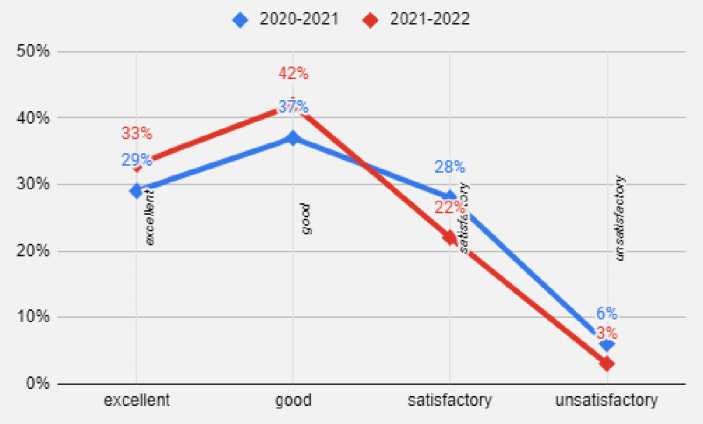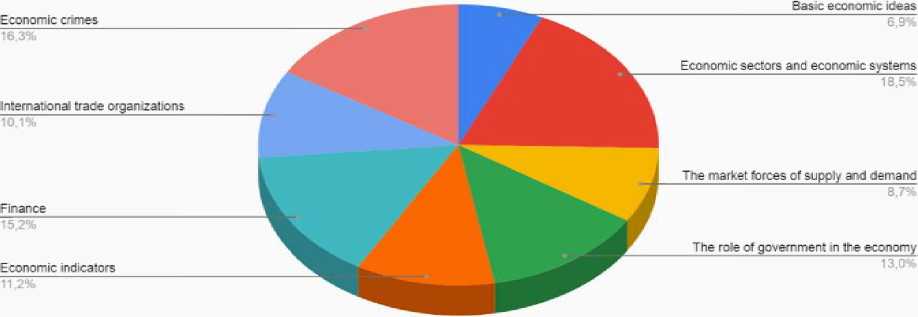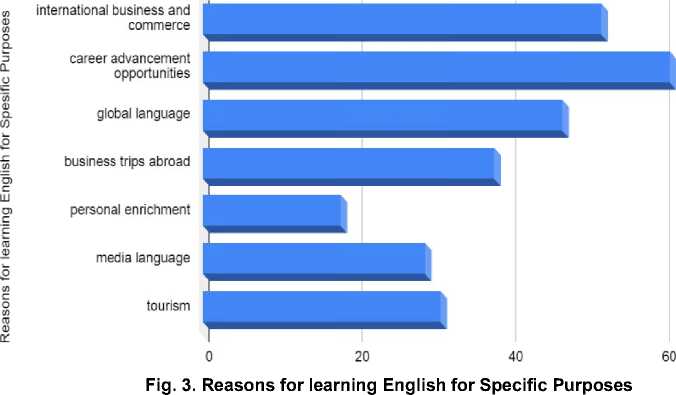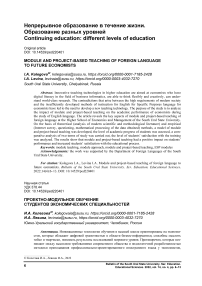Module and project-based teaching of foreign language to future economists
Автор: Kolegova I.A., Levina I.A.
Рубрика: Непрерывное образование в течение жизни. Образование разных уровней
Статья в выпуске: 4 т.14, 2022 года.
Бесплатный доступ
Innovative teaching technologies in higher education are aimed at economists who have digital literacy in the field of business informatics, are able to think flexibly and creatively, can understand world-class research. The contradictions that arise between the high requirements of modern society and the insufficiently developed methods of instruction for English for Specific Purposes language for economists have led to the need to develop a new teaching technology. The purpose of the study is to analyze the impact of module and project-based teaching on the academic performance of economists during the study of English language. The article reveals the key aspects of module and project-based teaching of foreign language at the Higher School of Economics and Management of the South Ural State University. On the basis of theoretical (analysis of modern scientific and methodological literature) and empirical (Internet survey, questioning, mathematical processing of the data obtained) methods, a model of module and project-based teaching was developed, the level of academic progress of students was assessed, a comparative analysis of two terms of study was carried out, the level of students’ satisfaction with the training was analyzed. The results show that module and project-based teaching had a positive impact on students’ performance and increased students’ satisfaction with the educational process.
Module teaching, module approach, module and project-based teaching, esp modules
Короткий адрес: https://sciup.org/147239431
IDR: 147239431 | УДК: 378.44 | DOI: 10.14529/ped220401
Текст научной статьи Module and project-based teaching of foreign language to future economists
Currently, progressive technologies of higher school teaching are focused on training economists of a new generation – a scientific and technical information professional, characterized by flexible deliberation and a creative attitude to solving problems, digital literacy, tolerant sensation and assimilation of world investigation and discoveries. Support for the digital economy is key to boosting technological innovation and services and essential to driving productivity growth. Almost all aspects of everyday life and business are becoming increasingly digital. That is why broadband networks, software development, cyber security and innovative digital technologies such as artificial intelligence and blockchain are priority areas for economic development [1, 2, 15].
Today it is not enough to possess the skills, capabilities and features that make a university graduate well-versed in a certain field [27]. Modern economic professional environment is greatly challenging, permanently evolving, and cumbersome to be in. Expanding a foreign language makes a vast contribution to the development of the individuality of the future highly qualified specialist [18, 19].
The contradictions that arise between the high demands of modern society and the insufficient development of methods of professionally oriented foreign language teaching among economists lead to the need of developing a new teaching technology. The important goal of educating a future economist is the acquisition of an active, freshly thinking person with a high level of foreign language.
Modular project-based training is considered to be the most efficient and prospective technologies for delivering the educational process in teaching a foreign language at a high school [6]. Modules let economists view professional topics as a logically full, absolute form of the content of an academic discipline, consisting of mental and professional aspects, the digestibility of which is concluded by a suitable form of control of knowledge, skills and capabilities formed as a result of expanding the material and preparing the final project by students [14]. The biggest advantage of a module is that it is a separate, comprehensive educational package containing a connection of teacher-learner cooperation, academic material and teaching technologies [11, 20].
According to A. Johnson [13], P. Knight [16], J. Richards [22], project-based teaching allow students to cooperate in teams, learning how to work creatively, tolerantly and flexibly, showing their knowledge in business IT sphere.
C. Garnham [8], A. Gil [9], K. Harding [10], L. Iswati [12] say that designing a module empowers educationally excellent and feasibly logical links between learner's goals, study outcomes, techniques and strategies, assessment criteria and evaluation.
The modular organization principle of educational material involves the organization of training in the form of professionally-oriented modules focused on:
■ determining students’ preferable learning directions and assist them flourish their knowledge to become more efficient language learners, during and after the lesson;
-
■ boosting students’ consciousness of how they learn and expand their abilities to become more individual and progressive language learners;
-
■ viewing diverse types of motivation and inspect ways to gain students’ motivation to learn English;
-
■ promoting communicative language learning;
-
■ developing students’ language cohesion and expressiveness when executing tasks [8, 17, 26].
The aim of our research is to study the influence of module and project-based training on students’ academic performance in the ESP course for future economists. The following research tasks are pursued: module and project-based teaching model design, the level of academic performance evaluation, score-rating system assessment, feedback questionnaire conducting.
In accordance with the working program in a foreign language for 2nd year students of economic specialties, we offer eight training modules for study: 1. “Basic economic ideas”; 2. “Economic sectors and economic systems”; 3. “The market forces of supply and demand”; 4. “The role of government in the economy”; 5. “Economic indicators”; 6. “Finance”; 7. “International trade organizations”; 8. “Economic crimes”.
The structure of each training module includes the following elements: exercises for reading, listening, writing, translating professionally-oriented vocabulary, grammatical notes for professional topics, searching and critical comprehension of material on the Internet, tasks such as case-study, problem-solving activity, networking, co-working, extra practice, discussion ideas, at the end of each module a project is presented. The following is an example of an assignment for discussion with students for a lesson “Digital economy”. Questions for discussion:
-
1. What is meant by digital world?
-
2. What does digital business mean?
-
3. What are the benefits of the digital world?
-
4. How safe is digital world?
-
5. What is digital technology?
-
6. What skills are important in digital world?
-
7. What are the types of digital technology?
Each module also includes video bank recordings of professionally oriented dialogues and monologues presented in the form of TED talks and interviews. The audio and video bank is equipped with lexical tasks to test the understanding. To control the acquisition of lexical material at the concluding phase of studying the theme, a list of basic professionally-oriented terms with definitions is proposed.
A regular spotlight on economic vocabulary empowers learners to become aware of practice using the specialist language they can use in their work. Authentic texts and practical tasks help prepare learners for their business life activities [23]. They are provided with an extended system of exercises aimed at boosting professional vocabulary, understanding texts, revising and practicing professional vocabulary grammar, stylistic use of terminology. An emphasis on listening and socializing develops their communicative capability within this professional ground. Additional practice materials offer relevant backing for teachers and students.
Each module provides students with various types of projects: research, construction (common currency, ideal economic system), real-world (investigation for external partners such as international market coordination tackled for business enterprises by students, scientific collaboration with oversea specialists) [1, 2, 13].
The following is an example of a construction project assignment for Economic Sectors module: “Chain of production” (Table 1). It shows examples of goods and services from the primary, secondary sectors that are necessary for the company Yellow Moon to operate successfully. The task is to identify the factors of production required by the chosen manufacturer to operate its business.
For Finance module we offer students to role-play a situation: “Money vs Happiness” (Table 2). In groups of four role-play the conversation “Money vs Happiness”. Read the instructions and think of some things you can say to support your case.
Table 1
|
Yellow Moon is an independent jewelry that is located in Pondicherry, India. The business owners design and make the jewelry in their workshop and it is sold to customers from its store and via the Internet through the firm's website. |
|
|
Activity / Sector |
Examples of goods / services required |
|
Primary |
Silver, gold and semi-precious stones |
|
Secondary |
Designers and jewelry makers to create the jewelry products |
|
Tertiary |
Advertising, insurance, banking and finance, transport of finished goods, website designers and a shop to sell the jewelry |
|
Produce a chain of production like the one above for: a) a mobile phone manufacturer b) a fast food restaurant chain c) a shop selling kitchen equipment d) a milk store |
|
Table 2
|
Student A You are a computer whiz kid who has made a billion from the internet. You think that money is the answer to everything, love, free time, even bereavement. So really, you don’t understand these people who say that money can’t buy you happiness. You’re happy, at least you think so, and you don’t care what anybody else thinks |
Student B You are an old woman who lost everything when you won a million pounds on the National Lottery. Your husband ran away with a younger woman. You lost most of your friends because they were jealous of your new lifestyle. In the end, all you had left was your money, and you hated every last penny as a result. You gave it all to charity, but it was too late |
|
Student C You live for the dream! The dream of making it big and living the high life! You don’t care about eating healthy food, studying, reading or even having a family, you just want a mansion and a butler. Sure, you have friends but it’s all so superficial. None of them are real friends, they just play the lottery like you, play bingo like you and spend every moment thinking about when you will be RICH! You see, nothing else matters, to you! |
Student D You work for the British National Lottery provider as an advisor. Your job is to prepare lottery winners for the changes that may happen in their lives when they receive their BIG prizes. We’re not talking twenty pounds here, but twenty million English pounds! You have seen many people come to you as happy and normal people, but come back two years later with problems that money won’t solve. Maybe money was the cause. So, you never want to be rich, just comfortable |
Chain of production
Role-play situation
Materials and Methods
Theoretical (analysis of modern scientific and methodological literature on the research problem) and empirical (Internet-based survey, questionnaire covering closed and open questions, methods of mathematical processing of the obtained data and their quantitative analysis) methods are applied in the study.
To achieve the goals, we identify positive aspects of module and project-based training model and test the students’ academic performance and satisfaction level with the education process. The Internet-based survey was conducted online using the service Google forms. 276 second year students of the Higher School of Economics and Management of the South Ural State University were involved in the survey. They had to respond a number of multiple-choice and open questions.
The survey was completely anonymous and responses were totally confidential. English level of participants according to CEFR standard (Common European Framework of Reference for Languages) was A2-B2. The research period included two academic years: 2020–2021 (traditional class) and 2021–2022 (module and projectbased teaching). The course duration was comprised 80 hours of work. The students’ academic performance of two periods of study was compared and analyzed.
Results and discussion
On picture (Fig. 1) two-line graphs of students’ academic performance are presented. Two periods of study time are compared. 2020–2021 is the period with traditional methods of teaching, 2021–2022 – module and project-based teaching model period. The results obtained suggest that students’ academic performance has increased

Fig. 1. Students' academic performance
while implementing module and project-based teaching model for ESP as compared with a traditional class. The students admitted that the course helped them to learn professional skills to future proof their career.
The level of students’ satisfaction with the education process was the main subject matter of our research: the attitude of students to various types of tasks and modules; reasons for ESP learning; students' evaluation of professionally-oriented modules. The students had to respond the following questions:
-
■ Do you find it useful to study English for specific purposes in the economic field?
-
■ Why is it important for a future economist to know English?
-
■ Does the content of the material correspond to your professional interests?
-
■ Which module of the tutorial did you like the most?
-
■ The development of what skills did you notice to a greater extent?
-
■ Is there enough practice to effectively master a foreign language for specific purposes?
-
■ What was of particular interest to you while studying?
-
■ Would you change anything in the course of teaching English for ESP?
-
■ How has your level of foreign languagesavvy changed compared to the beginning of the course?
Speaking about different professionally-oriented modules (Fig. 2), it should be mentioned that the majority liked the variety of topics for communication and discussions, especially such as Economic Sectors and Economic Systems,
Finance and Economic Crimes. These modules w e re of specific interest for students while studying.
Among the main reasons for learning English for Specific Purposes wer e (Fig. 3):
-
• career advancement opportunities (22% – 61 people), you need to be confident in delivery of English conversations to put forth your ideas and opinions;
-
• international busines s and commerce (19% – 52 people), working abroad can be a n amazing experience;
-
• global language (1 7 % – 47 people), being able to read fast and communicate e f ficiently is important;
-
• business trips abro a d (14% – 38 people), for using English efficiently and accurately you need to know the language properly;
-
• tourism (11% – 31 people), traveling is alw a ys very exciting, you can get a lot of impressions and adventures fro m trips to o ther countr i es;
-
• media language (10% – 29 people), nowadays the media has a great impact on the lives of people, the whole society, on our consciousness, even on our culture and language;
-
• personal enrichme n t (7% – 18 people), knowledge of the language, especially business, provides a person with a future. By learning the la n guage and maintaining knowledge, you can enjoy your benefits all your life, additional knowle d ge, experience and outlook.
On the basis of the profound survey and quantitative data analyses t he module and projectbased teaching model was created. T he model consists of three blocks (Table 3). Approach

Fig. 2. Students' evaluation of professionally-oriented modules

Table 3
|
Approach Complex |
||||
|
Objective: module and project-ba s ed teaching in ESP |
||||
|
Synergetic |
Communicative |
Competence-based |
||
|
Principles |
Comfortable digital environment; students’ autonomy; open instructor-student interaction |
Inductive learning; social progress |
Digital modeli n g; result oriented learning; students’ self-man a gement |
|
|
Technique |
Case studies; role plays |
Digital communication (forums, blogs, wikis) |
Projects; modeling tools (video / audio dialogues) |
|
|
Group Processes |
||||
|
Modules with set of lexical, grammatical exercises |
Discussions (module-oriented topics) |
ESP projects ( r esearch, real-world, construction) with presentation |
||
|
Assessment |
||||
|
Internal/External |
Summative/Formative |
|||
|
Check-points |
Vocabulary and grammar tests, written assignments, project tasks |
Lexica l and grammatical tests / cy c les of feedback and revisio n , end-of-term assessment |
||
|
Criteria |
Task completion, grammatical spectrum and accuracy, lexical capability, fluency and pronunciation, coherence |
|||
Module and project-based teaching model
complex block gives the principles and techniques to reach the main objective. Result-oriented competence-based communicative principles are prevailed. Case studies, role-plays, projects are the most important techniques in teaching. Group processes block discloses the teaching/learning classroom procedure designated in modules, discussions, ESP projects. Assessment block contains two parts: check-points and essential criteria.
Conclusion
This research shows that module and projectbased teaching for ESP had a positive impact on students' academic performance and the level of students’ satisfaction with the education process.
The use of a project-modular approach in foreign language education to students of economic specialties forcefully contributes to the development of communicative competence and professionally intense personality qualities, such as the strong motive for smooth improvement of knowledge, the capability to make decisions and solve nonstandard tasks. Creativity and independence help in the formation of readiness of future economists for adaptation and self-realization in the labor market of modern society. Economists must be able to communicate across national and cultural boundaries, and English is the vehicle for professional advancing technology.
Список литературы Module and project-based teaching of foreign language to future economists
- Ahmed S.T.S. Communicative Competence in English as a Foreign Language: It's Meaning and the Pedagogical Considerations for its Development. The Creative Launcher, 2018, vol. 2. Available at: https://www.researchgate.net/publication/324392820 (accessed 25.09.2022).
- Alexio M.B. Teachers' Attitudes of Communicative Language Teaching Use in Brazil. Graduate Theses, Dissertations, and Problem Reports. West Virginia, US, West Virginia University Publ., 2003. Available at: https://researchrepository.wvu.edu/etd/719. DOI 10.33915/etd.719 (accessed 23.05.2022).
- Bell D. Help! I've Been Asked to Teach a Class on ESP! IATEFL Voices, 2002, iss. 169. Available at: http://www.iatefl.org/content/newsletter/169.php (accessed 29.04.2009).
- Brahja A. Overcoming difficulties ESP students have in doing ESP tasks. European Journal of Literature and Linguistics, 2015, no. 2, pp. 28-32.
- Brown G., Atkins M. Effective Teaching in Higher Education. London, Routledge Publ, 1991. 254 p.
- Dastenova F. The Role of Module technology in Teaching Sequence of Time in the English Language. Young Scientist, 2017, vol. 23 (157), pp. 300-301.
- Dudley-Evans T. English for Specific Purposes. The Cambridge Guide to TESOL, Cambridge: Cambridge University Press Publ., 2001. 301 p.
- Garnham C., Kaleta R. Introduction to Hybrid Courses. Teaching with Technology Today, 2002, vol. 8, no. 6. Available at: http://www.uwsa.edu/ttt/articles/garnham.htm (accessed 3.09.2020).
- Gil A. The Role of the Internet in Self-Study. Society. Intergration. Education. Proceedings of the International Scientific Conference, 2015, vol. 4, pp. 393-404.
- Harding K. English for Specific Purposes. Oxford: Oxford University Press Publ., 2007. 184 p.
- Ibyatova L., Oparina K., Rakova E. Modular Approach to Teaching and Learning Grammar in Technical Universities Society. Integration. Education. Proceedings of the International Scientific Conference, 2018, vol. 1, pp. 139-148. Available at: https://www.researchgate.net/publication/325368627 (accessed 14.02.2021).
- Iswati L., Triastuti A. Voicing the challenges of esp teaching: Lessons from esp in non-english departments. Studies in English Language and Education, 2021, vol. 8, no. 1, pp. 276-293. DOI: 10.24815/siele.v8i1.17301
- Johnson A.L. Teaching Creative Problem Solving and Applied Reasoning Skills: A Modular Approach. Legal Education, California Western Law Review, 1998, vol. 34, iss. 2, pp. 389-396.
- Kadirbekova D.Kh. Attempts to create learner corpus for ESP students. Foreign Languages in Uzbekistan, 2019, no. 1 (24), pp. 120-125.
- Kleban M. Academic English language teachers' roles in a virtual and hybrid exchange project. Philological Class, 2021, vol. 26, no. 3, pp. 178-187. DOI: 10.51762/1FK-2021-26-03-15
- Knight P.T. Being a Teacher in Higher Education. Buckingham, England: Society for Research into Higher Education & Open University Press Publ., 2002. 245 p.
- Kuzmina N.N., Kochkina D.V., Kuzmin M.G. Digital distance learning tools in academics' ESP training. Bulletin of the South Ural State University. Series: Education. Educational sciences, 2022, vol. 14, no. 2, pp. 81-94. DOI 10.14529/ped220208
- Matvienko E. Training special vocabulary in professionally- oriented teaching of English to students of economics. Modern School of Russia. Modernization Issues, 2021, no. 8-2 (37), pp. 246-248.
- Nuttall C. Teaching Reading Skills in a Foreign Language. Oxford, Heinemann Publ., 1996. 292 p.
- Poddubnaya Y.N., Martynova A.S., Lomonosova E.I. Increasing the Motivation of Agricultural Universities Students to Studying English with the Help of Project Method. Journal for educators, teachers, trainers, 2021, vol. 12, no. 2, pp. 159-132. DOI 10.47750/jett.2021.12.02.020
- Prauzner T. Analysis of the Results of the Pedagogical Research and Eeg in the Aspect of Effective Modern Teaching Aids in the Technical Education. Society. Integration. Education. Proceedings of the International Scientific Conference, 2015, vol. 4.414. Available at: https://www.researchgate.net/ publication/277887350 (accessed 23.10.2020).
- Richards J. Communicative Language Teaching Today. Cambridge University Press Publ., 2006. 52 p.
- Rudnitsky A. Course Design: A Guide to Curriculum Development for Teachers. New York, Longman Publ., 2001. 271 p.
- Sadiq S., Zamir Sh. Effectiveness of Modular Approach in Teaching at University Level. Journal of Education and Practice, 2014, vol. 5, no. 17. Available at: http://www.iiste.org/book (accessed 15.02.2020).
- Spada N. Communicative Language Teaching: Current Status and Future Prospects. International Hand Book of English Language Teaching (Part I). New York, Springer Publ., 2007. 87 p.
- Shraiber E.G., Kolmakova V.S. Academic integration of law and journalism ESP courses through mock trial. Bulletin of the South Ural State University. Ser. Education. Educational sciences, 2021, vol. 13, no 1, pp. 39-52. DOI 10.14529/ped210104
- Volchenkova K.N. Peer observation as a tool for teacher's professional development and the way to increase the quality of the education process. Bulletin of the South Ural State University. Ser. Education. Educational sciences, 2016, vol. 8, no. 3, pp. 39-43. DOI 10.14529/ped160304


